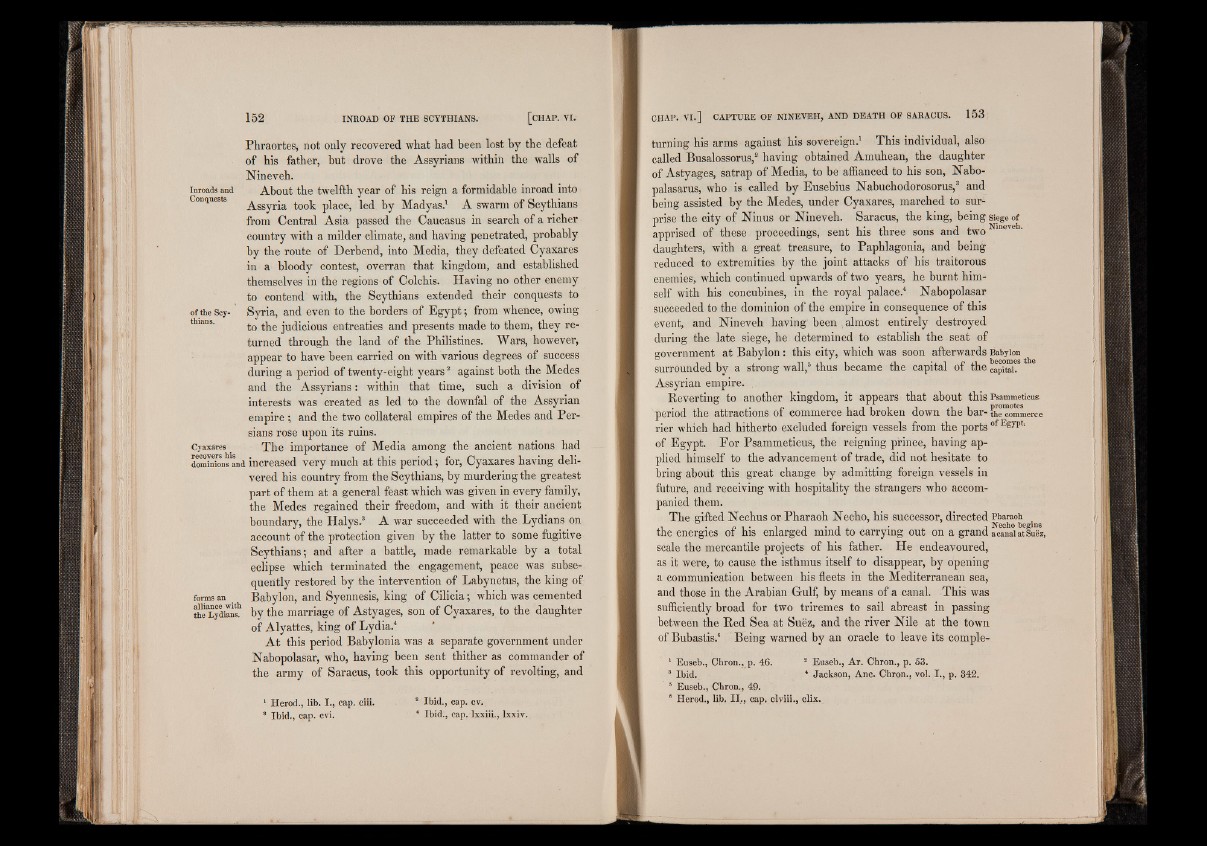
Phraortes, not only recovered what had been lost by the defeat
of his father, but drove the Assyrians within the walls of
Nineveh.
inroads and About the twelfth year of his reign a formidable inroad into
Conquests Assyria took place, led by Madyas.1 A swarm of Scythians
from Central Asia passed the Caucasus in search of a richer
country with a milder climate, and having penetrated, probably
by the route of Derbend, into Media, they defeated Cyaxares
in a bloody contest, overran that kingdom, and established
themselves in the regions of Colchis. Having no other enemy
to contend with, the Scythians extended their conquests to
of the Soy- Syria, and even to the borders of Egypt; from whence, owing
to the judicious entreaties and presents made to them, they returned
through the land of the Philistines. Wars, however,
appear to have been carried on with various degrees of success
during a period of twenty-eight years2 against both the Medes
and the Assyrians: within that time, such a division of
interests was created as led to the downfal of the Assyrian
empire ; and the two collateral empires of the Medes and Persians
rose upon its ruins.
Cyaxares The importance of Media among the ancient nations had
dominiousandincreased very much at this period; for, Cyaxares having delivered
his country from the Scythians, by murdering the greatest
part of them at a general feast which was given in every family,
the Medes regained their freedom, and with it their ancient
boundary, the Halys.3 A war succeeded with the Lydians on
account of the protection given by the latter to some fugitive
Scythians; and after a battle, made remarkable by a total
eclipse which terminated the engagement, peace was subsequently
restored by the intervention of Labynetus, the king of
forms an Babylon, and Syennesis, king of Cilicia; which was cemented
the'LydiM? by the marriage of Astyages, son of Cyaxares, to the daughter
of Alyattes, king of Lydia.4
At this period Babylonia was a separate government under
Nabopolasar, who, having been sent thither as commander of
the army of Saracus, took this opportunity of revolting, and
1 Herod., lib. I., cap. ciii.
3 Ibid., cap. cvi.
3 Ibid., cap. cv.
* Ibid., cap. lxxiii., lxxiv.
turning his arms against his sovereign.1 This individual, also
called Busalossorus,2 having obtained Amuhean, the daughter
of Astyages, satrap of Media, to be affianced to his son, Nabo-
palasarus, who is called by Eusebius Nabuchodorosorus,3 and
being assisted by the Medes, under Cyaxares, marched to surprise
the city of Ninus or Nineveh. Saracus, the king, being siege of
apprised of these proceedings, sent his three sons and twoNine'e '
daughters, with a great treasure, to Paphlagonia, and being
reduced to extremities by the joint attacks of his traitorous
enemies, which continued upwards of two years, he burnt himself
with his concubines, in the royal palace.4 Nabopolasar
succeeded to the dominion of the empire in consequence of this
event, and Nineveh having been .almost entirely destroyed
during the late siege, he determined to establish the seat of
government at Babylon: this city, which was soon afterwards Babylon
surrounded by a strong wall,6 thus became the capital of the capital.
Assyrian empire. .
Reverting to another kingdom, it appears that about this Psammetiens
period the attractions of commerce had broken down the bar- the'oommerce
rier which had hitherto excluded foreign vessels from the ports ofEgypt-
of Egypt. For Psammeticus, the reigning prince, having applied
himself to the advancement of trade, did not hesitate to
bring about this great change by admitting foreign vessels in
future, and receiving with hospitality the strangers who accompanied
them.
The gifted Nechus or Pharaoh Necho, his successor, directed Pharaoh
the energies of his enlarged mind to carrying out on a grand a canal at Suez,
scale the mercantile projects of his father. He endeavoured,
as it were, to cause the isthmus itself to disappear, by opening
a communication between his fleets in the Mediterranean sea,
and those in the Arabian Gulf, by means of a canal. This was
sufficiently broad for two triremes to sail abreast in passing
between the Red Sea at Suez, and the river Nile at the town
of Bubastis.6 Being warned by an oracle to leave its comple-
1 Euseb., Chron., p. 46. 3 Euseb., Ar. Chron., p. 53.
3 Ibid. * Jackson, Anc. Chron., vol. I ., p. 342.
5 Euseb., Chron., 49.
‘ Herod., lib. I I ,, cap. clviii., clix.